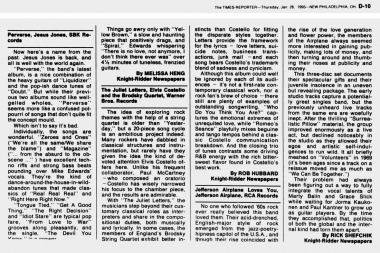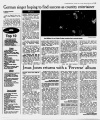From The Elvis Costello Wiki
(diff) ← Older revision | Latest revision (diff) | Newer revision → (diff)
| New Philadelp. Times-Reporter
|
—
|
The Juliet Letters
Elvis Costello and the Brodsky Quartet
Rob Hubbard
|
The idea of exploring rock themes with the help of a string quartet is older than "Yesterday," but a 20-piece song cycle is an ambitious project indeed. Many rockers have dabbled in classical structures and instrumentation, but rarely have they given the idea the kind of devoted attention Elvis Costello offers here. Unlike his frequent collaborator, Paul McCartney — who composed an oratorio — Costello has wisely narrowed his focus to the chamber piece, and the results are admirable.
With The Juliet Letters, the musicians step beyond their customary classical roles as interpreters and share in the compositional duties, both musically and lyrically. In some cases, the members of England's Brodsky String Quartet exhibit better instincts than Costello for fitting the disparate styles together. Letters provide the framework for the lyrics — love letters, suicide notes, business transactions, junk mail — and each song bears Costello's trademark blend of sadness and cynicism.
Although this album could well be ignored by each of its audiences — it's not a first-rate contemporary classical work, nor a rock fan's brew of choice there still are plenty of examples of outstanding songwriting. "Who Do You Think You Are?" captures the emotional extremes of unrequited love, while "Romeo's Seance" playfully mixes beguine and tango tempos behind a classic Costello communication breakdown. And the closing trio of tunes contrasts some driving R&B energy with the rich bittersweet flavor found in Costello's best work.
|
|

Clipping.
Page scan.

|

|
|
|
External links